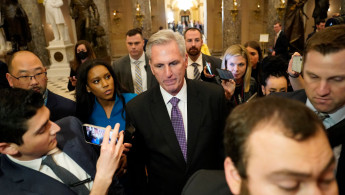Explainer: Why can't the Republicans elect a house speaker in the US?
With their new majority in the US House of Representatives, Republicans should be celebrating. Instead, they're in the unusual predicament of not being able to unite to elect a new speaker.
Far-right congressman Kevin McCarthy of California, who has until now served as minority leader, has long been seen as the leading candidate, though also controversial due to other right-wing representatives deeming him as insufficiently pro-Trump. He blamed Trump for the 6 January insurrection, but also opposed his impeachment and visited him at Mar-a-Lago.
"You just have some bomb throwers on the far right who won't be happy with anyone," J. Miles Coleman, associate editor of Sabato's Crystal Ball at the University of Virginia Center for Politics, told The New Arab Wednesday afternoon, shortly after the sixth unsuccessful vote.
"The far-right representatives want to make a show of this. They're not interested in governing. It's almost silly. McCarthy has been a very loyal Republican, but he's not far right enough for those voting against him," he added.
To elect the House Majority Speaker, the nominee needs 218 votes. Traditionally, these votes only come from the majority party, but there have already been suggestions of soliciting Democratic votes that could help end the deadlock. Without this confirmation, Congress members will remain unconfirmed and therefore unable to legislate.
This is the first time a speaker hasn't been chosen on the first vote since 1923. The current deadlock is still far shorter than in 1855 to 1856, when it took two months to choose between 20 candidates.
That impasse in the mid-1800s was just five years prior to the civil war when the country was deeply divided over race and slavery. Today, the country is also deeply divided, though this time the divisions are less clear within the Republican Party, which has largely shifted to the far right in recent years.
Those who are holding up the vote are largely comprised of the Freedom Caucus, which is considered the furthest right bloc in the House. More than half of the 20 voters opposing McCarthy deny the outcome of the 2020 presidential election.
Some of the most outspoken critics of those opposing McCarthy are also part of the far-right wing of the party. Representative Dan Crenshaw of Texas has been openly accusing them of simply wanting attention.
He told CNN they were "very clearly looking for notoriety over principle." He went on to call Lauren Boebert and Bob Good losers, saying they did not sufficiently contribute to the party and lacked knowledge of basic policy.
The public fiasco of the paralysed Congress has been comedy fodder for late-night hosts, who need only show the chaos inside the Capitol to get a laugh. It has also been a boon for CSPAN, the notoriously boring station that typically shows unattended speeches on the House floor.
Among the most viewed scenes during the two days of gridlock is Alexandria Ocasio-Cortez speaking with Paul Gosar, and at another point with Matt Gaetz, leading to speculation over what she would be discussing with far-right Republicans.
She later told the Intercept that Gaetz told her that McCarthy had been "telling Republicans that he’ll be able to cut a deal with Democrats to vote present, enabling him to win a majority of those present and voting, according to Ocasio-Cortez. She told Gaetz that wasn’t happening, and also double-checked with Democratic party leadership, confirming there’d be no side deal."
It's unclear if he was targeting her specifically, or if she happened to be the nearest Democrat around.
What is clear is that Republicans do not have a viable path forward to elect a Speaker of the House. There are multiple scenarios that could resolve that impasse if McCarthy is unable to gain the needed votes.
"The longer this goes on, the more likely we are to see something creative," said Coleman.
The Republicans could elect a speaker to the right of McCarthy. The Republicans could find a more centrist option and then get the needed votes from the Democrats or someone from outside the House could be chosen, as the constitution does not stipulate that the speaker be a sitting member of Congress.
"Predictions are always difficult, but my best guess would be that another conservative Republican is selected as Speaker of the House, most likely Rep Steve Scalise or Rep. Elise Stefanik, both of whom currently serve in the Republican leadership in the House," Sara Chatfield, assistant professor of political science at the University of Denver, told TNA. She believes a "compromise" moderate Republican speaker would be unlikely.
"At some point, some other Republican may emerge as being acceptable to all groups. Some group of Democrats could help the more moderate Republicans elect such a candidate," Paul J. Quirk, Phil Lind Chair in US Politics and Representation at the University of British Columbia, told TNA.
He expects that "whoever becomes Speaker will have great difficulty keeping the party unified and able to act on legislation. The Republican House will be dysfunctional for the next two years."





 Follow the Middle East's top stories in English at The New Arab on Google News
Follow the Middle East's top stories in English at The New Arab on Google News


